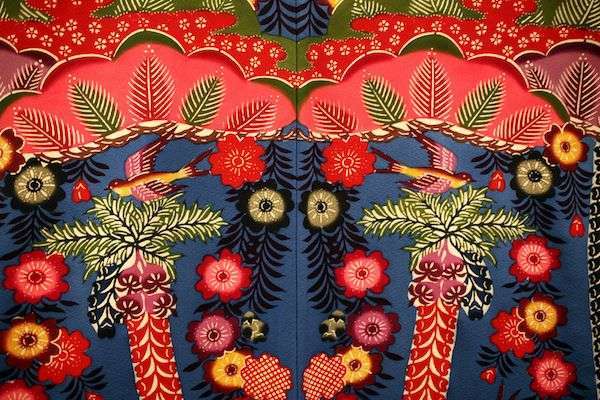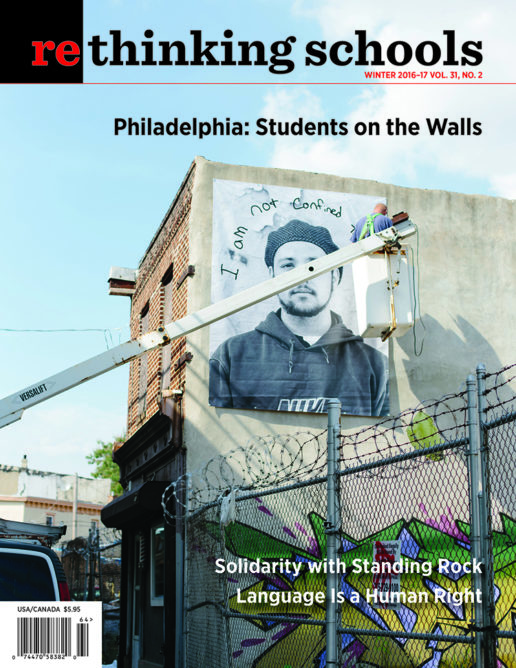Uchinaaguchi: The Language of My Heart
Illustrator: Ryukyu Bingata

“Don’t you talk that dirty language,” my teacher shouted at me after he punched me in the head. I got up from the floor, dusted off the navy skirt of my school uniform, and put my chin up. I walked away as he continued to shout at me in Japanese with that unmistakable island accent. As I walked down the 8th-grade hall, I could still hear him. I walked straight out of the school building and out of the gates of our school.
I took a pledge that day: No one will ever stop me from speaking Uchinaaguchi, the Indigenous language of my homeland, Okinawa. I came to the United States as an immigrant when I was a small child. I returned to Okinawa as a 13-year-old with the hope of learning about our culture, language, and history. This was the lesson of my first week of school back on my home island.
In 1972, the Japanese government re-annexed the Ryukyu IslandsÑmy beloved Kingdom of Dragons. Okinawa is the largest of the islands. My mother was 19, just starting college. She had grown up during the “American generation,” when the U.S. military occupied all 55 of our islands. As students, my mother and father were taught both Japanese and English, as the use of Uchinaa-guchi diminishedÑkept out of the schools even back then. So when I got home that day, my head still hurting, my father wasn’t surprised by what had happened. He said: “It’s a Japanese school. You’re supposed to speak Japanese.” I felt a flood of tears begin.
But my grandfather sat on the floor across the room and began to teach me the story: In 1945, our country was caught in the cross fire and destroyed. Occupied by Japan, we were the island that the Allies wanted as a stepping stone to invade Japan. The two military forces staged their fight without regard for Okinawa’s sovereignty. As many as 150,000 Okinawan civilians, many of them children, died during the three-month battle. My grandfather watched. He saw his own best friends killed by Japanese and U.S. soldiers during the bombings and battles. Yet he promised himself that war would never bully him into forgetting who he was. He said he needed me to remember: “Don’t let anyone make you forget who you are.” I told him I had walked away from my teacher and walked out of the school. “We all have to stand up,” he said. “When it’s wrong, we have to stand up.”
Under Japanese government control, the public school system in Okinawa enforces the sole use of the Japanese language in curriculum and teaching. All of the textbooks and content emphasize the centrality of Japanese language and culture. Every teacher I had from early elementary and middle school upheld this in their teaching practices and classroom interactions. Being a good student meant assimilating, following the rule that Uchinanchu-speaking students of Okinawa speak Japanese at all times. My grandparents’ generation proudly spoke Uchinaaguchi. Now, 70 years after the Battle of Okinawa, UNESCO has declared Uchinaaguchi a “severely endangered” language.
Today, most speakers of Uchinaaguchi are past the age of 50. My generation can’t understand the elders who speak to us at the markets. The minyo_ lyrics and hummable melodies instantly bring me to tears, yet I’m unable to translate the words for my children. I wish they could feel the kanasasoulmnÑthat’s a word that doesn’t exist in English. It expresses the emotion that you love something so much that it brings you sadness. The aunties and uncles who animate their conversations with tone changes and arms swaying gather at our homes, maintaining our Indigenous oral storytelling ways. But our youth are deaf to this language.
I have friends who say that they wish their skin was lighter, that their last name didn’t make their island roots so obvious, that they will make sure their children speak without a hint of island accent.
They have forgotten. They have forgotten that we are the result of Indigenous beauty thousands of years old, the date unknown because we are a people of oral language, not written language. They have forgotten that our island dancers tell the stories of ocean waves with their hands, our resilience with their stomping, our friendliness in their eyes, and our humor in the way the lips curve to display sarcasm. Tii, the firm hand strikes of our Okinawan karate, reveal the powerful resistance developed long ago to fight against Japanese feudal occupation. And they have forgotten the respect given to the oldest woman of the family leading the u_to_to_ of Indigenous prayer, connecting this world with loved ones in the spirit world. But I will not forget.
I will tell my children and my students about the day when my little sister, Aki, at the age of 6, danced in front of thousands of island people, mostly elderly grandparents, in a festival to honor our culture. Smiles of pride could be seen stretching to the very back row. Their shouts in our native tongue cued to rhythm so perfectly that it sent vibrations through my spine. Mesmerized by the taiko drumming and the red and gold streaming down the dancers’ backs, one elder after another wiped their tears. When Aki and her friends finished their dances and walked off stage, one grandmother raised her wrinkled hand, beckoning Aki to come as I stood nearby waiting to greet her. Aki looked at me, unsure, and I gestured for her to go ahead. The grandmother took Aki’s hand, rubbed it gently, and thanked her in Uchinaaguchi, saying “Nihe-debiru” over and over as she wept. The grandmother’s daughter draped a lei of candy around Aki’s neck. The grandmother said to Aki, “Don’t forget who you are. Don’t ever forget,” as she walked slowly away.
No Indigenous people should have to fight having their language taken away from the youth. Mirukuyuu is another word that doesn’t exist in Japanese or English. Both languages translate it as youth. But when we Uchinanchu hear mirukuyuu, it means peaceful generation at the same time as we visualize calm ocean waves. If our mirukuyuu lose their language, they will lose their culture and their identity. Schools must be places where our youth are empowered to learn and nourish heritage languages, to use them and spread them to the next generation. And this must begin today. My language is not dirty. My language is powerful. Kanasasoulmn, Uchinaaguchi, the language of my heart.

